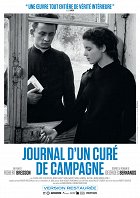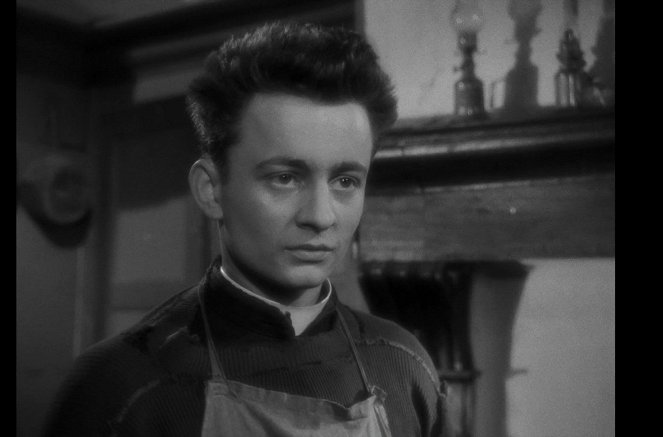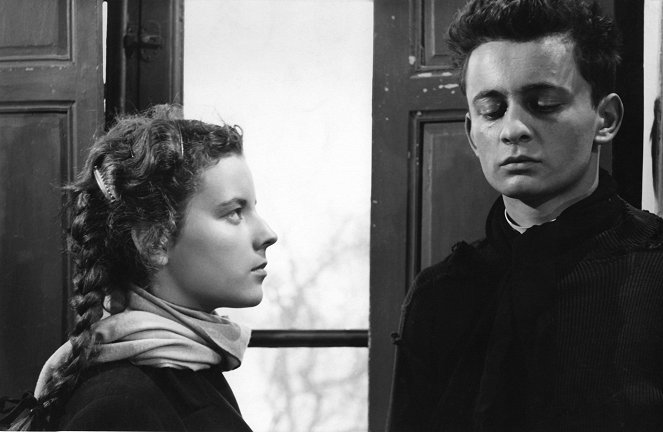Rendező:
Robert BressonForgatókönyvíró:
Robert BressonOperatőr:
Léonce-Henri BurelZeneszerző:
Jean-Jacques GrünenwaldSzereplők:
Claude Laydu, Adrien Borel, Nicole Maurey, Jean Riveyre, Nicole Ladmiral, Rachel Bérendt, Yvette Etiévant, Antoine Balpêtré, Jean Danet, Serge Bento (több)Tartalmak(1)
„Mozgókép: képes művészet, melynek semmit sem szabad ábrázolnia.” Ez a megvalósíthatatlannak látszó paradoxon Bresson ars poeticája, melyet először itt valósított meg. A film legmeghökkentőbb rendezői eljárása, hogy általában szó szerint olvassák fel benne Bernanos regényének szövegeit, miközben a képsorokon éppen a szöveg adott része elevenedik meg. A halálos beteg fiatal plébános egy isten háta mögötti falu parókiáján önmaga rabja. Nem bízik önmagában, következésképp Istenben sem. Hitét nem tudja kisugározni a hívekre, a falusiak nem szeretik, egy falusi kislány konokul utálja. Szembenáll idősebb, atyai szigort tanúsító felettesével, a kastély urai megvetéssel viseltetnek iránta. Mindezt a külső konfliktushálót Bresson kizárólag a plébános belső drámájaként tárja elénk. (Örökmozgó)
(több)Videók (1)
Recenziók (4)
Nicely conceived to an almost bookish recitation that emphasizes the main character's inner motivations and his growing doubts at the expense of the dramatic plot, but so dull and monotonous that it's just not pretty. The mechanically composed scenes and their message are enchanting and purifying only for a die-hard Christian, for us average alcoholics it's just uninteresting and minimalist Bresson's masturbation…
()
Like the book on which its based, this film does everything possible to ensure that we will not enjoy it. The narrator, a young man trying to hold on to his faith despite his own doubts and those of others, tells us through his diary (everything has been written down) what will happen and what we will see. All of the tension is built up inside of him, while he himself does not show any emotion, unlike the other, more lively characters – whether unbelievers or believers without the sincerity that the protagonist strives for. Through his untainted character without attributes, he offers a point of view, a grid through which we can interpret the film. Bresson’s minimalism doesn’t offer much room for further interpretation with only a few recurring settings, predominantly interiors, close-ups and the narrator’s voice. The priest is imprisoned in his own world and we with him. There are no superfluous shots, no distractions. An ascetic film. Painful, yet purifying. 80%
()
I have problems with faith, I have already written about it in various places. The problem is that I simply don't believe in the sense of religion, and this film, which looks at faith and atheism from various perspectives, couldn't convince me either. The acting performances are excellent because they are non-acting, but overall, the movie didn't captivate me as I thought it would.
()
What is most interesting about this film is how it can fascinate and deeply affect members of the Catholic minority, who have a strong tendency to find true, long-unseen spirituality in it. It directly calls for a confrontation with the atheist point of view. Personally, I consider Bresson's project to be a somewhat tiresome, but tolerably filmed study of an emotionally immature man, who, mainly due to his own fault, lives in social isolation within the community and is (rightfully) plagued by doubts about his ability to withstand the priesthood at a time when the sheep were slowly but surely becoming more educated and freethinking citizens, making the position and work of pastors somewhat difficult. The truth is that if you want to succeed in the modern world as a priest, you need much more than just belief in the existence of God. You must also have a good understanding of human psychology and empathy for human imperfections and needs. The young pastor's loneliness is his own doing, and his suffering does not touch me more than any other seriously ill person of his age. Bresson's Catholicism leaves me cold. I perceive an absence of dramatic tension, stiffness, and exhaustion in the film. For example, a confrontation between the values of the world and the attitude of the priest with his peer - a member of the foreign legion who offers friendship to the priest - would be interesting even today and for a viewer like me. However, Bresson avoided it, as it apparently had no significance for his Catholic beliefs and cinematic vision. Overall impression: 50%.
()



Hirdetés